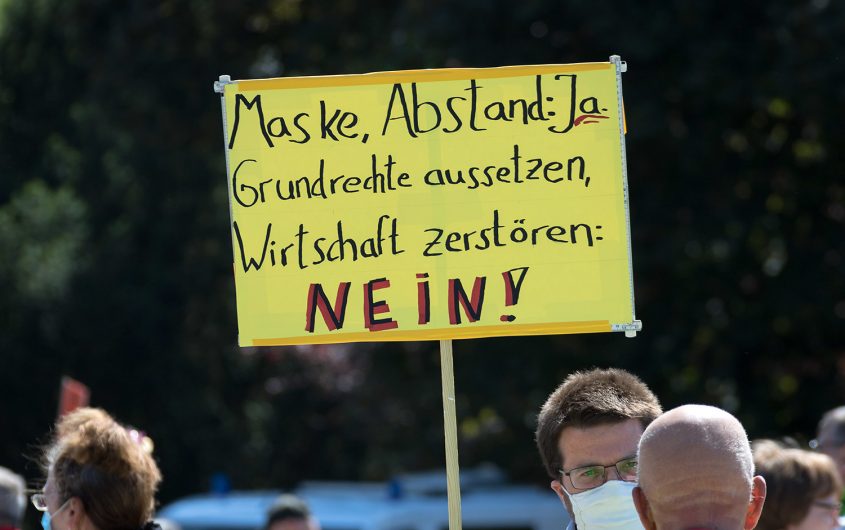
Kai Schwerdt via Flickr
COVID-19: Challenge and Chance for Germany. How to Overcome Renationalization and Distrust

Andreas Freytag
Friedrich-Schiller-University Jena
Dr. Andreas Freytag is Professor of Economics at the Friedrich-Schiller-University Jena, Honorary Professor at the University of Stellenbosch, and Visiting Professor at the Institute of International Trade, University of Adelaide. He is also Director of G20 Trade and Investment Research Network. He is a DAAD/AGI Research Fellow in October and November 2023.
Dr. Freytag obtained his diploma from the University of Kiel and his doctorate as well as his Habilitation from the University of Cologne. He has published a number of books and articles in first-class peer-reviewed journals on economic policy, international trade policy, development economics, and international policy coordination. He contributes to blogs and for over ten years had a weekly column on wiwo-online, a German magazine.
During his time at the AGI, Andreas Freytag will focus on the substance and path of tightened transatlantic relations against the background of the systemic competition between the West and autocratic states. The latter comprise some emerging economies, including Russia and China. This escalation has geo-political and geo-economic consequences and makes it necessary to strengthen the ties between transatlantic partners as well as to reach out jointly to attract third countries to the Western values.
To maintain Western leadership in standard-setting as well as helping developing countries to enforce universal human rights and environmental standards, there needs to be a coordinated and broad-based strategy to (1) react to Chinese et al. attempts to define and set standards, which become binding for third countries’ companies. Similarly, (2) due diligence legislation may also be more effective if coordinated across the Atlantic. Although not in the center of analysis, another (3) aspect deals with the transatlantic trade relations as such, which are also in need of a revitalization.
This project focuses on the geo-economic aspects of systems competition although it is difficult to disentangle economic and political relations. It analyzes ways to intensify the transatlantic relations with the objective to maintain economic welfare as well as to position the Western partners better to counter autocracies’ attempts to gain influence in the world economy.
The Pandemic Hits the World In a Time of Renationalization and Distrust
The global corona pandemic has hit the world economy severely; lockdowns in almost all countries have interrupted and halted global supply chains and led to sharp recessions in both industrialized and developed countries. Unfortunately, the crisis does not come at a time of global stability and trust, but rather in a period of increasing tensions and insecurities that already threatened prosperity before the crisis started in early 2020. In the last few years global value chains obviously have been shortened due to digital (i.e., technological) developments and political (i.e., protectionist) initiatives, encouraging companies to re-shore businesses. The decade since the global financial crisis (GFC) has not been a period of stability and trust; the World Trade Organization (WTO) has not been able to provide this kind of stability, as it is facing strong headwinds.
There are many signs of even increasing international trade conflict and other political and economic tensions. The United States has aggressively imposed trade barriers not only on those countries who openly violate international trade rules, such as China, but also on its allies in Europe, Korea, and Japan. Brexit adds to the tensions, this time within Europe. Interestingly and surprisingly, the German government has not been immune to the temptation of industrial policy, as the National Industry Strategy 2030: Strategic guidelines for a German and European industrial policy, presented by economics minister Peter Altmaier in 2019, clearly documents. Last but not least to mention here is China’s aggressive attitude toward those who dare to criticize the communist government (among them citizens of Hong Kong) as well as permanent attempts from foreign governments to destabilize Western democracies. In other words, the crisis hits the global economy in a phase of renationalization and distrust.
It also has to be kept in mind that the world is facing numerous other challenges that would normally require the full concentration of global leaders: climate change, other environmental challenges of local nature, substantial and opposing demographic challenges in the OECD and many developing countries, and finally a number of hot conflicts, causing more problems.
Germany Is In Dire Need of Stability
Against this background, the global pandemic is a particular threat to the German economy, which traditionally is dependent on global supply chains from two directions. It needs inputs, in particular natural resources and semi-processed goods from all the over the world, and it is dependent on its customers who are willing to purchase the high-quality, high-price goods (partly) “Made in Germany.”
In addition to this dependence on globally open markets, Germany is also dependent on stability in the European Union, which is the most important market for German products. But there is much more at stake than just the stability of markets and fiscal and monetary stability within the Eurozone. German society demands safe, open borders and a politically rational policy environment, characterized by policymakers aware of the costs of nationalist policies.
Finally, and closely related, the so-called refugee crisis of 2015 and thereafter has shown that the Germany, as any other European country, needs stable political and economic conditions in Africa. The stronger the economy develops in African countries, the faster a middle class emerges; the better governance structures in African nations emerge, the less the economic and political frictions are in Europe due to migration. Needless to say, that it is first and foremost in the interest of the people in Africa themselves.
In sum, the German business model requires global stability as only then is the German product portfolio not only attractive, but also affordable for firms and consumers in other countries.
The Way Forward
In such gloomy times, it is of utmost importance to recognize and address these problems. While the U.S. and China arguably fail to offer such leadership, others must be more willing to steer against the tendency of nationalism, distrust, and potential conflict. It is positive that the European Union has expressed its determination to not resort to trade policy and to strive for an open world order. This need has also been recognized by many governments and international organizations, including the G20. It has also pledged to a debt moratorium for the poorest countries, which is the least it could do.
Here Germany can play a meaningful role, in particular since it seems to be reacting in a both moderate and energetic form to the crisis. The government has domestically and internationally earned some respect and reputation for its epidemiological and economic response to the crisis. It would be highly advisable to use this additional political and diplomatic weight for a visible contribution to a fast and comprehensive global recovery. This contribution should be made on three levels: domestic, European, and global.
Domestic Priorities
In the last few years, economic policy in Germany has become complacent and incoherent. It is obvious that the good economic performance since the GFC has discouraged policy adjustment, in particular in the field of tax policy, energy policy, subsidies, regulation, and bureaucracy. The COVID-19 crisis offers an opportunity (and shows the need) to improve the supply side conditions for the German business community, in particular the Mittelstand. It also must be clear that all subsidies paid to German business as compensation for losses through the corona crisis are only meant to secure the survival of competitive firms; any future distortion of trade must be avoided. This could be accompanied by a reform of the highly distortive German subsidies policy: According to the Kiel Institute, public subsidies to private businesses on all governmental levels made up 5.5 percent of GDP (more than €185 billion).
The government should make a clear commitment that it will not remain a long-term shareholder in private sector firms that receive support during the pandemic.
Many observers additionally fear that the state involvement in large companies, such as the German airline Lufthansa, will change the pattern of the economy, lead to concentration, and distort competition. The government should make a clear commitment that it will not remain a long-term shareholder in private sector firms that receive support during the pandemic. The corona crisis has led to a higher trust in the state’s capacity to solve problems, which is good in principle. However, governments on all domestic levels should always be aware of the limits to the power and knowledge of state actors and their role in the assignment of responsibilities: a strong and successful state sets the framework for the economy, but does not act as entrepreneur itself.
The German EU Presidency as Challenge and Chance
Germany will take over the EU presidency in July 2020. This offers the opportunity to take a leading role in fighting the joint emergence of the pandemic and the obviously severe European legitimacy crisis. The government should contribute to a clarification of the concept of solidarity. It seems that solidarity in Europe increasingly is mistaken as other taxpayers’ money and not as good rules and joint initiatives to address those challenges that are truly supranational. The political task would be to engage in all those fields where common interest exists, such as protecting the external borders and trade order and safeguarding the internal market, and at the same time to acknowledge the subsidiary principle in cases where purely national problems exist.
This task is very difficult against the background of very different and contradictory economic policy philosophies within the EU, notably between the two accepted drivers of the integration process: France, with the concept of “Planification,” and Germany, with its tradition of “Social Market Economy.” There will be little space to overcome these differences, the only chance being to accept the subsidiary principle.
Against this background, the current Franco-German initiative “Overcoming the crisis united and emerging from it stronger,” as formulated by Chancellor Merkel and President Macron, seems to be a mixed blessing. On the one hand, it is positive that there is support for those who are hit hardest by the crisis. On the other hand, the four elements of this initiative are dubious:
- Strategic independence in the health sector sounds good given the negative experiences at the beginning of the crisis. However, it must not be mixed with autarky. To the contrary, there is one urgent need to stop constructivist fantasies, in particular initiatives to politically encourage (or force) firms to repatriate supply chains on the national as well as the EU level. Most companies will decide to restructure their value chains after the crisis anyway (if they had not started to do so before), so there is no need to force them. They might—as a recent survey by Germany Trade and Invest (GTAI) suggests—leave various countries, e.g., China, and move elsewhere, but not necessarily home. Such political initiatives might thus only result in vicious protectionist circles. What is needed is a smart mix of self-production and worldwide diversified supply chains for medical devices.
- The joint borrowing capacity for the European Commission labeled temporary recovery fund (up to €500 billion) for transfers to those countries hit hard by the corona crisis is an important step for fighting the crisis. However, it is unclear how temporary the fund is and if it is needed to pay grants rather than loans. Many observers—among them the so-called Frugal Four—fear a mutualization of debts and a permanent EU taxation through the backdoor. Both dangers carry the potential to blow up the Union.
- Supporting the Green Deal sounds good, but the initiative contains too strong interventionist elements. It would be fully sufficient (and both efficient and effective) to focus on the price mechanism for greenhouse gases. Instead, the partners pledge to develop sectoral plans. That does not sound like trust in the innovative capacity of entrepreneurs.
- Similarly frightening, industrial policy is the fourth pillar, which again contains much interventionist potential (despite the wording, which was clearly chosen to mollify the German public).
In sum, the initiative is clearly written in the spirit of “Planification” and it suffers from unclear responsibilities. It will not tackle but rather prolong the European crisis; it would just repeat the mistakes it made in the euro crisis a decade ago. One can only hope that the German presidency does not result in a disastrous mixture of interventionism and fiscal irresponsibility.
A Likely Contribution on the Global Scale
As for the global level, the German government should use all channels to further support and strengthen multilateral cooperation. This aspect includes the G20 and the communication opportunities it provides to overcome conflicts between members of the group. Similarly, more plurilateral initiatives to strengthen the WTO such as the voluntary alternative dispute settlement mechanism (DSM) should be initiated, as the vacancy of the Director General may provide an opportunity to place more weight to the organization. It also seems appropriate to express a clear position with respect to attempts to misuse the World Health Organization for power politics, as seen lately.
Practically, a strong commitment to global cooperation also in the field of health policy, including the prohibition of any export curbs for medical devices or vaccines, is necessary. In addition, bold measures to cooperate with developing countries are needed; these include both a concentration of aid flows and deeper economic cooperation. Improving and strengthening the German system of investment promotion is one step, redirecting official development aid (ODA) funds into investment promotion is the second one. Finally, Germany and other countries should give ODA a priority for infrastructure, education, and health.
It is definitely in the interest of the German government to minimize global frictions and growing tensions within the international community. Germany should therefore use both its increasing influence and its good fiscal position to take bold measures domestically, in the EU, and globally to help end the corona crisis sooner rather than later. It would be naïve to believe that Germany will immediately change behavioral patterns of global players. Nevertheless, the potential of a German government to make a difference has rarely been higher. It would be a shame not to use the crisis as a trigger for reforms.
Support for this article was generously provided by The German Marshall Fund of the United States.







